
Literature & Non-fiction
Immerse yourself in the world of literature – discover the new autumn releases and experience your favourite authors up close.
Portrait of Ulla Lenze
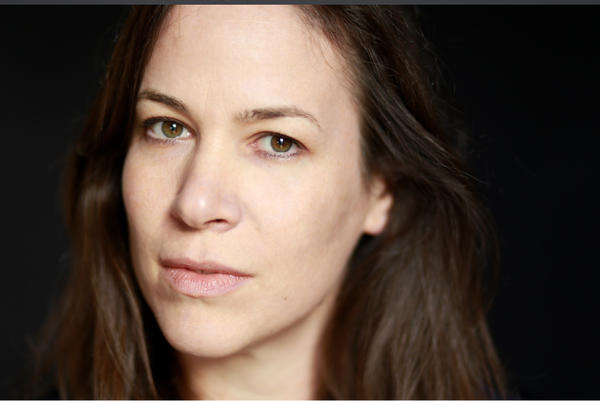
© Julien Menand
Between two worlds
In her profound novel “Der Empfänger” (The Receiver), which takes us back to the time of the Second World War, Ulla Lenze tells the life story of her great uncle. The author, who likes to move between cultures, is currently writer-in-residence in Bonn, Germany.
Ulla Lenze is on the road a lot. Travelling and writing go hand in hand for the writer, who was born in Mönchengladbach, Germany, in 1973. Already as a 16-year-old student, she lived abroad for half a year with an Indian family, she was a writer in Damascus and a writer-in-residence in Mumbai for nine months. She knows Istanbul and Basra. Her novels profit from these experiences. Her debut "Schwester und Bruder" (Sister and Brother), published in 2003, already tells of the upsetting effect that an encounter with a completely different reality can have.
For the first time, her latest novel “Der Empfänger” now also takes readers into another time. Ulla Lenze follows a German emigrant to New York, where he is hired by the Nazi secret service during World War II. This time, she did not find her unfathomable, conflict-laden material on lengthy journeys. It literally fell into her hands in her Rhineland parents' house: an extensive correspondence between her grandfather Carl, a soap dealer from Neuss, and his brother Josef, who had emigrated to the USA.
"While reading the letters, I noticed a discrepancy between the image that emerged, namely of a cosmopolitan, even ideology-free person, and the knowledge that he was a convicted Nazi agent. Thinking about how all of this fits together, I developed the literary figure of Josef Klein," says the author. Klein spends eight years, from 1941 to 1949, in prison and an internment camp. Then he is deported to Germany by the Americans. But he feels strange in his old homeland.

Ulla Lenze: Der Empfänger
(English: The Receiver)
Klett-Cotta, 302 pages, 22.00 €
It is a sensation familiar to the author: "I keep moving between cultures and worlds, so I can easily imagine what it’s like for someone who doesn't know where he belongs," she says. Ulla Lenze is currently writer-in-residence in Bonn, Germany. This comes with the requirement to live in an apartment in the suburb of Bad Godesberg. After that, she will probably soon be travelling again – to far-off parts of the world.
Text: Holger Heimann
Talk with: Robert Seethaler
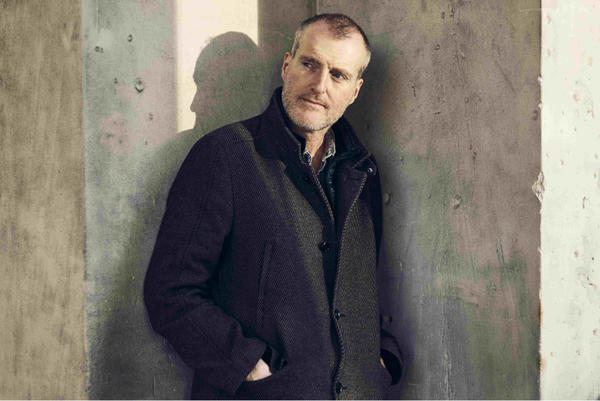
© UrbanZintel
“I think you have to reinvent the character”
Robert Seethaler’s “Der letzte Satz” (The Last Movement) is a poignant book about Gustav Mahler's last journey. In an interview he explains how it came about, and what connects him with Mahler.
What does the music of Gustav Mahler mean to you?
Robert Seethaler: Thirty years ago, I was in a theatre near Vienna, and for the first time I consciously heard Mahler, a small excerpt from the First Symphony. That stuck. Even before that, as a young man on a kibbutz, I came into contact with Mahler's music, but that’s another story. It's like in literature, if you strike a note, it keeps on resonating. And if you are lucky, it stays. But I can't listen to so much music, not even that of Gustav Mahler. It's as if the music is blowing me away. I would prefer a gentle breeze. Instead, I’m destined to wring silence out of words, the stillness.
In the novel, there's a line: "You can't talk about music, there is no language for it.” Isn't that tricky for a book about a famous composer?
I was not interested in the myth of Gustav Mahler, but in the event of humanity behind the myth. Music is indescribable, that's how it should be. The problem is that actually everything is indescribable. You can't chase after images with words, you have to approach them slowly.

Robert Seethaler: Der letzte Satz
(English: The Last Movement)
Hanser Berlin, 126 pages, 19.00 €
Much has been written about Gustav Mahler. Have you read most of it?
I read the biography by Jens Malte Fischer, but that's it. I think that in order to get close to someone, you have to reinvent the character, instead of reporting on them. That's what I’ve tried to do. I am not a journalist who spends weeks and months researching Gustav Mahler. It's more about getting close to what makes people tick.
Do you feel closer to Mahler after writing the novel?
No, but it doesn't matter. From a distance, it’s often possible to get a better view. If you get too close, everything gets blurry. I’ve tried to move towards him. But he is a stranger to me. Maybe it's the strangeness that attracts me. How strange was he in the world? He always saw himself as a stranger. And how strange am I in the world? I can't experience any real closeness to Mahler. At the same time, there’s something that’s very attractive or interesting about him, and I’ve tried to pursue that. Perhaps it’s the strangeness within myself.
Interview: Holger Heimann
Book recommendation and Portrait: Olga Grjasnowa
Culture shock in the countryside
Olga Gryaznova is one of the most important literary voices of her generation. In her new novel “Der verlorene Sohn” (English: The Prodigal Son) she tells the story of a boy who, torn from his homeland, is caught between cultures and religions.
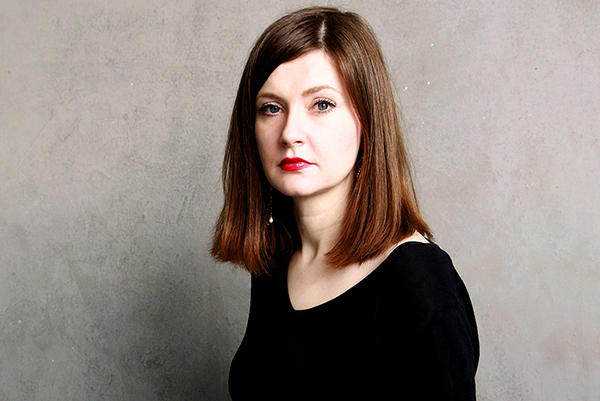
Olga Gryaznova has had an eventful life. She was born in 1984 in Baku into a Russian Jewish family and emigrated with her family to Germany in 1996. Their first years in Hesse were complicated, because she didn’t speak a word of German. However, it wasn’t the cultural differences between Azerbaijan and Germany that she particularly noticed but the contrasts between city and country that weighed more heavily.
"We came from Baku and landed in a village. There was not even a bus here. I did not know country life before. That was the bigger culture shock for me," she says. She learned German quickly, and she still speaks it today with a slight Russian accent. Later she studied literary writing at the Institute of Literature in Leipzig, as well as art history, Slavic studies and dance studies.
In her celebrated debut "Der Russe ist einer, der Birken liebt" (English: All Russians Love Birch Trees), which was released in 2012, she tells of the sense of displacement of a young generation in a globalised world. In a later novel she confronts her readers with the horrors of the civil war in Syria and the hardships of flight.

Olga Grjasnowa: Der verlorene Sohn
(English: The Prodigal Son)
Aufbau, 383 pages, 22.- €
Gryaznova has always addressed the contemporary realities of life. Her new novel "Der verlorene Sohn" now takes us surprisingly into the 19th century. A boy, who is supposed to lead the Muslim people of the North Caucasus, is abducted and made a Russian officer at the Tsar's court in St. Petersburg. The world where he grew up fades more and more. When he is supposed to return after 15 years, it does not lead to the fulfilment of a longing. In the end, he does not completely belong anywhere and is no longer at home anywhere.
Olga Gryaznova shows with a keen sense for nuances how difficult, even hopeless, it can be to escape foreign characteristics and labels – especially in a world in which strict ethnic and social boundaries are drawn. "Der verlorene Sohn" tells a sad story from a different era and is based on historical facts. The questions of foreignness and belonging, however, which the novel touches on, remain current. For the author, these are the themes of life.
Text: Holger Heimann
Focus on: New releases worth reading
Everyday people
Sorrow and mourning, freedom and love: these books are brimming with life – and literary quality! For stimulating reading this autumn, you cannot go wrong with this list of recommendations.
Experience with deadly forces had a great impact on David Vann, his books seem to be obsessed with painful loss, with guilt and failure. In “Momentum”, he describes the last days of his father's life. The novel never strays far from its depression-ridden protagonist and traces his path to an inexorable finale.

David Vann: Momentum
Translated into German by Cornelius Reiber.
Hanser Berlin, 302 pages, 24.00 €
Barely less threatening is the journey undertaken by an alcohol-sick sociology professor from Berlin in Bov Bjerg's “Serpentinen” (Switchbacks). The man wants to share the scenes of this own childhood with his son in South-West Germany's Swabian Jura, while also struggling with a dark family tradition. All of the narrator's forefathers have taken their own lives. A steep, winding trip.

Bov Bjerg: Serpentinen
(English: Switchbacks)
Claassen, 272 pages, 22.00 €
Being on the road has always provided material for great books from Wolfgang Büscher. But this time his range is severely limited: a remote forest cabin. In isolation, Büscher discovers the sweet taste of freedom; childhood memories flash before his eyes. A delicately crafted book all about coming to rest, to a “Heimkehr” (Homecoming).

Wolfgang Büscher: Heimkehr
(English: Homecoming) Rowohlt Berlin Verlag, 208 pages, 22.00 €
In his book “Glücksritter“ (Adventurer), Michael Kleeberg undertakes a fascinating line of research. His wish to understand his dead father, with whom he had a love-hate relationship, expands to take in a whole generation as well as a lot of painful soul-searching.

Michael Kleeberg: Glücksritter
Recherche über meinen Vater.
(English: Adventurer: Researching my Father) Galiani Berlin, 240 pages, 20.00 €
A counterpart from the East German perspective can be found with the Weimar-born dramatist Olivia Wenzel in her first autobiographical novel, “1000 Serpentinen Angst” (1000 Coils of Fear), which combines reminiscences about her complicated family history with a sensitive awareness of the present.

Olivia Wenzel: 1000 Serpentinen Angst
(English: 1,000 Coils of Fear) S. Fischer Verlag, 352 pages, 21.00 €
With “Der Freund” (The Friend), Sigrid Nunez has given us a novel of mourning. A writer is trying to come to grips with the unexpected suicide of her best friend. She finds solace in life with the dog that the deceased friend has left her. Her very personal entries about a year of mourning turn into a vivid contemplation of life.

Sigrid Nunez: Der Freund
Translated into German by Anette Grube.
(English: The Friend) Aufbau Verlag, 235 pages, 20.00 €
A very unique relationship comes about in the latest book by Sally Rooney, celebrated as the “voice of the millennials” in her “Normale Menschen” (Normal People), the second offering from the young rising star. It follows the emotional roller-coaster of two young lovers who just cannot seem to find a lasting way to love each other. It is an old story, told by Rooney in her own personal way.

Sally Rooney: Normale Menschen
Translated into German by Zoë Beck. (English: Normal People) Luchterhand, 320 pages, 20.00 €
3 Reading tips

Mario Vargas Llosa: “Harte Jahre”
Translated into German by Thomas Brovot. (English: Hard Times)
Suhrkamp, 412 pages, 24.00 €
Mario Vargas Llosa: “Harte Jahre”
Translated into German by Thomas Brovot. (English: Hard Times)
Suhrkamp, 412 pages, 24.00 €
The cynicism of power
Mario Vargas Llosas' work is marked by its ongoing analysis of the continuing original sin of many nations in Latin America: unscrupulous dictators. And in “Hard Times”, the dedicated author and Nobel Prize laureate remains true to his lifelong theme. Closely drawn from historical events, the captivating and dark political thriller describes how cynical generals seized power in Guatemala at the middle of the last century with help of the CIA. They throw the country, which was in the midst of a process of reform, into chaos and ensure that it remains a banana republic.

Birgit Birnbacher: Ich an meiner Seite (English: Me by My Side)
Zsolnay, 272 pages, 23.00 €
Birgit Birnbacher: Ich an meiner Seite (English: Me by My Side)
Zsolnay, 272 pages, 23.00 €
Precarious relationships
Birgit Birnbacher knows her way around convoluted biographies; she is not only a writer, but also a social worker. Her writing benefits from her precise knowledge of precarious situations and social marginalisation. Her second novel “Me by My Side” shows how hard it is for a former juvenile convict to get back on their feet. It has less to do with the released convict meeting a therapist who is also having trouble coping. Much more so, the 35-year-old Austrian precisely describes traumatic events that occurred in prison and the prejudices of a society that considers itself enlightened.
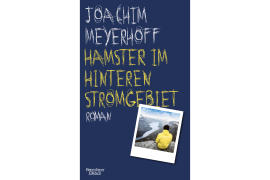
Joachim Meyerhoff: Hamster im hinteren Stromgebiet
Alle Toten fliegen hoch, Band 5. (English: A Hamster up the Creek The Dead Fly High, Vol. 5)
Kiepenheuer & Witsch, 320 pages, 24.00 €
Joachim Meyerhoff: Hamster im hinteren Stromgebiet
Alle Toten fliegen hoch, Band 5. (English: A Hamster up the Creek The Dead Fly High, Vol. 5)
Kiepenheuer & Witsch, 320 pages, 24.00 €
The master of the fast lane lands in the ICU
Actor and author Joachim Meyerhoff spent his life onstage and published book after book to great success. Now the autobiographical project has found an unexpected continuation. Shortly after his 51st birthday, the master of the fast lane suffered a stroke that robbed him of everything he had come to take for granted. He lands in the intensive care unit of a hospital in Vienna and doesn’t know if he’ll ever be able to act onstage again. Existentially shattered, the patient seeks and finds his own personal way out of the crisis: Meyerhoff rises up to counter the stroke head-on. His moving novel is the product of tragicomic self-assertion.
30 years after reunification
Taking stock
1990. The long-awaited reunification of Germany is complete – bringing with it great expectations, but also fears and concerns. How do things look for the country 30 years down the line? These books help make sense of the events and the current situation.
Light and shadow
In his fact-laden work, journalist and historian Kai-Axel Aanderud casts a critical eye and takes stock of the economic, cultural, and social developments in Germany since 1990. In doing so, he makes it clear that a lot, but by far not everything has been achieved. A well-researched analysis that prompts us to re-evaluate events and, most of all, offers a wealth of new information for those who have grown up in a united Germany.

Kai-Axel Aanderud: 30 Jahre deutsche Einheit (English: 30 Years of German Unity)
Mittler, 272 pages, 24.95 €
The Berlin Republic
Since 1990, Germany has changed rapidly and over the years has repeatedly faced new challenges. Edgar Wolfrum offers highly worthwhile reading with his history of the Berlin Republic, describing how the country mastered (and continues to master) these internal and international political challenges, which social divisions still exist, and which successes have been achieved.

Edgar Wolfrum: Der Aufsteiger (English: The Achiever)
Klett-Cotta, 368 pages, 24.00 €
Learning from history
Germany is constantly re-inventing itself, according to the thesis put forward by Frankfurter Allgemeine Zeitung political editor Reinhard Müller, who has intensively analysed the roots of this great creative strength. What feeds Germany's sense of national identity, and how does the world see the country 30 years after reunification? An evaluation without whitewashing.

Reinhard Müller: Schwarz Rot Gut (English: Black Red Good)
Frankfurter Allgemeine Buch, 208 pages, 20.00 €
Looking back in anger
The view that Daniela Dahn and Rainer Mausfeld cast on 30 years of unity is not a benevolent one. They highlight the large rift that remains between East and West, and look into the reasons behind it. How did things really play out back then, and who has profited most from “selling out the East”? It is concisely formulated and reads like a thriller. A well substantiated, leftist approach.

Daniela Dahn, Rainer Mausfeld: Tamtam und Tabu (English: Hoopla and Taboo)
Westend, 240 pages, 18.00 €
Texts: Claudia Finke
Book recommendation
The future of punishment
There are currently around 64,000 people serving prison terms in Germany. But is a prison sentence actually the best form of punishment? Attorney Thomas Galli holds a critical view.
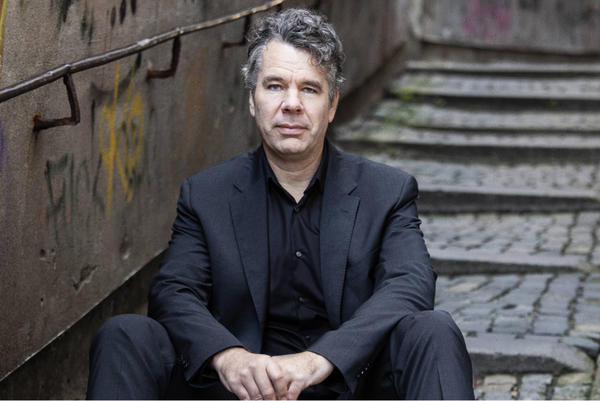
© Ronald Hansch
A world without prisons? Inconceivable. After all, for centuries incarceration has been a proven form of discipline for criminals. Far removed from normal everyday life, the convicts pay for their deeds, repent, and rehabilitate so that they can find their place in society again as “better” people. At least in theory. In practice, things look quite different.
The attorney Thomas Galli, who himself has served as director of two prisons, doubts the effectiveness of imprisonment in most cases. The recidivism rates are high, the criminals rarely assume any responsibility for their deeds, nor do they provide any form of restitution. Aside from isolating highly dangerous criminals, Galli claims prisons are of no use to anyone.

Thomas Galli: Weggesperrt (English: Locked Away)
Why prisons are of no use to anyone
Edition Körber, 312 Pages, 18.00 €
That is why it is necessary to reconsider, as Galli does, more effective and alternative forms of punishment and rehabilitation that also take into account the viewpoints and wishes of the victims. Galli offers examples that provide extensive insight into criminal justice and puts forward strong arguments to counter the usual reasoning behind prison sentences. In order to truly bring about justice, even reconciliation, he proposes a radical reform of the justice system. Concrete proposals on what these punishments of the future might look like round out this fascinating, highly readable analysis of a controversial topic.
Text: Sabine Rock
Newsletter
Stay up to date about trends, offers and relevant news by subscribing to our newsletter.
